- Featured in:

What Are Writing Skills?
Writing skills are what make it possible for you to communicate a message with clarity and organization in a text format.
While it’s common to think that writing is a single skill, it can be broken down into component skills that make a good writer such as grammar, structure, messaging, tone and voice, word choice, research and reader engagement.
The importance of writing skills
We live in a text-heavy world and many businesses rely on the written word to communicate with their clients, customers, employees and business partners.
The style of writing that is most valued varies depending on the specific nature of the business you’re interested in working for. Different roles tend to require different kinds of writing skills.
For example, roles in editing require a focus on grammar, spelling and style, while roles in journalism require skills in research and accountability. Technical writing, on the other hand, requires the ability to explain complex processes in a simple way, and roles in marketing require attention-grabbing and persuasive language.
That said, employers often want to see your writing skills in action before they’ll hire you for a job.
For instance, while programmers might have to perform a coding test to get hired, the strength of many creative professionals such as writers, artists, filmmakers and others, is proven through their portfolio. A portfolio features a selection of work you’ve produced that shows employers you can handle the needs of the role.
You should include a portfolio with your resume and cover letter if you’re applying for a writing-centric job!
Namely, for roles in academia, advertising, copywriting, content creation, digital media, editing, email campaign management, journalism, marketing, screenwriting and public relations –– it’s in your best interest to include a portfolio!
However, if you know that the job might involve writing, but isn’t writing-focused, it is not necessary to include a portfolio. An administrative assistant position or a teaching position that mentions writing emails in the job description is a good example of roles that do not require one.
Top Writing Skills
Research
It’s important that you get your facts straight and consider all the angles before you write –– especially if it’s for academia, journalism, presentations or official company announcements. Good writers ensure the information they use is well-sourced and accurate. Being a valuable writing asset means reading closely, verifying your sources, having subject awareness and strong attention to detail!
Persuasiveness
Many companies rely on writers to create content that can persuade an audience by appealing to consumers or convincing investors. In these cases, your ability to craft a sales pitch that resonates and creates interest can be a powerful tool! Persuasiveness strategies like storytelling and emotional appeal are great to give your writing the power to influence.
Assuming brand voice
Many businesses need writers who can step into a role and create advertisements, content and promotions that are in line with the brand identity and tone. It takes strong attention to detail and creativity to say fresh things in someone else’s familiar voice.
Word choice
If composing a message with the right tone and sensitivity is your strong suit, it could pay to mention it to employers. Word choice can make a world of difference in fields like branding, community outreach, marketing, public relations, social justice and journalism.
Editing
Editing is the most important step to ensure your writing is polished and professional. Moreso, good editing skills help your writing flow and convey all the essential information with conciseness. Editing skills are valuable because high-quality content is produced when you adhere to best practice standards, usage and writing techniques.
Reading comprehension
At the core of every good writer is an avid reader who doesn’t miss a word and completely understands the underlying message. Reading comprehension is especially valuable for jobs that require you to explain large or complex topics in a simple way to readers, such as technical writing or journalism. The more you understand what you read, the easier you can explain it to others!
Time management
Writing is often compared to a journey because your goal is to get from the first sentence to the end. While every writer may have a different writing process, it should focus on effective time management. Time management shows that beyond the artistry of your craft, you have an understanding of business needs and the productivity to make it happen.
Meeting deadlines
Even if you’re the best wordsmith around, you must produce high-caliber work by deadline! You’ll be far more likely to get the job if you convince the employer that not only do you produce good work, but you do it on time
Storytelling
Storytelling is a popular method to capture and hold the attention of a reader by creating interest. Once a reader is caught up in a good story, they are far more likely to keep reading until the end! This can be a powerful tool in the world of marketing and advertising.
Organization
Organizing the information you need to relay in a bite-size and digestible way makes communication more effective. Well-organized writing will greatly increase the strength and impact of your message on your audience.
Outlining
Outlining refers to your ability to plan and structure your message before you go through the process of writing it. Outlining skills can be useful because having a guide allows you to make adjustments as needed before time and resources are invested into producing a polished written product.
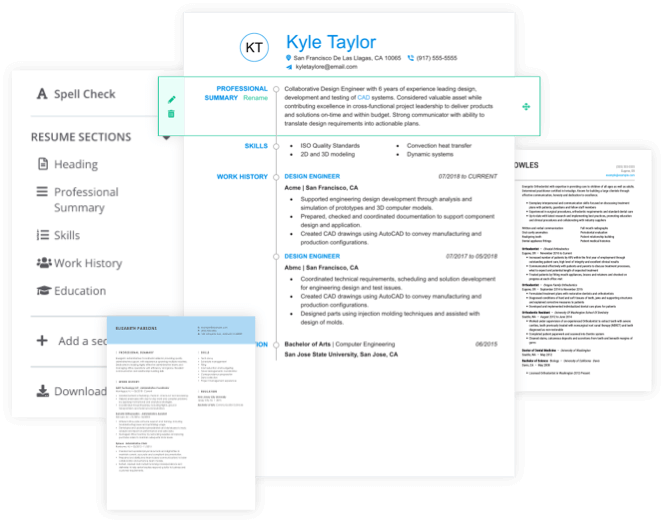
How to Showcase Writing Skills
Here’s some tips you should follow to sell your writing skills in your resume, cover letter, portfolio and interview!
In all four cases, it starts with these preparatory steps:
The job description or post is the tool an employer uses to let you know what they want to see in the candidate they hire –– they tell you word-by-word what they want to see in your application documents!
Target the skills and keywords it mentions that seem the most important. After that, it’s much easier to know which skills you should address in your documents!
Consider the types of writing the job would require you to do.
Who would be the audience? What style of writing are they looking for? What format do they want the writing done in, e.g., email, publication or web copy?
If you understand who the company needs to write for, what kind of content they need written and the style of writing they want –– it will help you decide what type of information you should feature from your background.
So, echo back phrases that you see in the listing if they apply to your background and skill set. This will show that you’re a close reader, an effective communicator, and best of all, help you pass the applicant tracking system (ATS).
Many companies, including most that post job ads online, use ATS to prescreen candidates.
The ATS scans your resume and cover letter looking for specific keywords or phrases programmed in by the hiring company. That means a human being might not even see your application documents unless they contain some of the right phrases or keywords!
Writing skills in your resume
There are three best places to feature writing skills in your resume.
The first is to have a dedicated “skills” section. List six to eight total skills, and make sure they’re a balance of hard and soft skills. This should be standard on most resumes.
The second option is to mention your writing skills as part of your work experience. For instance, instead of just listing “SEO Content Writing” as a skill, you could list it as a bullet point, like this: “Executed comprehensive SEO content writing practices to achieve page one search results.”
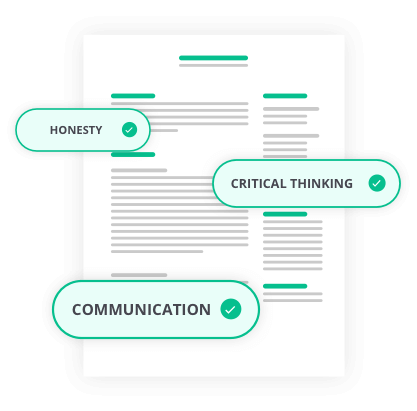
Better yet, you should use numbers and metrics like, “Produced two 500+ word articles per week.” This indicates to employers the level of your writing ability.
A third option is to include a link to your online portfolio underneath your email address. This is something recommended only if a portfolio is required or will give you a competitive edge, i.e., other candidates may include one for the job.
Be sure to check out our complete guide on How to Write Resume Skills if you want to learn more about how to incorporate skills into your resume.
Another great tool that JobHero offers is our Resume Builder!
Our builder was designed by our team of career professionals to custom tailor a resume to the specific job title to which you’re applying.. That way, you get some guidance and suggestions in choosing the right set of skills to include!
You can also use the builder to shave off a lot of time on the resume-writing process because it takes care of the design elements for you. You’ll end up with a professional-looking resume tailored for the position you want!
Writing skills in your cover letter
A cover letter is meant to complement your resume and give extra background that may compel the employer to ask you for an interview. If your writing ability is central to the role that you’re applying to, your cover letter should be on point!You need to demonstrate that you can keep a reader’s attention and present information about yourself in a clear, concise and convincing manner. Give an anecdote about your writing skills that illustrates your strengths.
If possible, frame it in a problem-action-resolution setup. First, identify an obstacle you had to confront, then identify how you put your writing skills into action, and then explain the positive outcome.
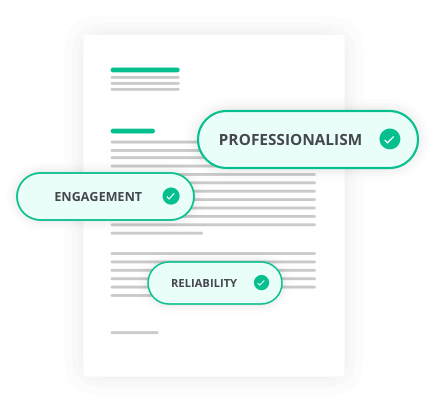
Here is an example of how a UX writer candidate could justify their writing skills in a cover letter body paragraph:
“One of my initial trial-by-fire challenges at my last job came when I was tasked with designing a short and clear button prompt for users of our social media site warning them that following a given link might lead to unverified or potentially offensive content. Working cross-functionally with our legal department, after much brainstorming, I devised an “Acknowledge and proceed” button that was seen by the platform’s 14+ million users. This better informs those users and prevents substantial liability conflicts due to user-shared links.”
Of course, you’ve got to consider what your prospective employer wants to hear and put your example together using your own experience.
If you want to make the writing process even easier and more focused, check out JobHero’s Cover Letter Builder. You can use it to create a cover letter in minutes because it automates the pesky steps that slow you down like formatting and setting up the margins. Plus, it’s got auto-suggestions for all the essentials of a cover letter so that you can be sure you’re covering all the necessary bases.
Link to a portfolio
It’s also acceptable to mention in the closing portion of your cover letter that you’re including a link to your portfolio. Hyperlink the portfolio to make it easier for the hiring manager to see it.
You could say something as simple as: “Thank you for your time and consideration in this role. I’ve included a link to my writing portfolio for you to check out my work. Please let me know if I can resolve any questions. Otherwise, I hope for the chance to speak with you about this opportunity in person!”
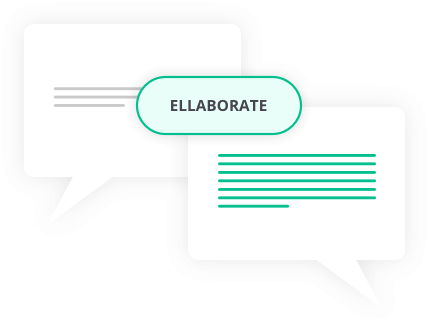
As far as the content of a writing portfolio, the work you feature should be the most in line with what the current employer is seeking for their role.
You could host the portfolio in a shared Google Doc with samples of your work. Or, if you’re applying for a higher-level writing position, it wouldn’t hurt to have your own website with a page dedicated as a writing portfolio.
Feature work that you think will resonate most with the employer’s needs!
Writing skills during your interview
If you are lucky enough to be called for an interview, it’s going to require preparation to discuss your writing skills.
Much like how you can use your cover letter to tell a story, in your interview, you need to support claims you make about your writing skills with evidence that you get noticeable results.
So, if you know that writing skills are central to doing your job, for instance, copywriting, then be prepared to discuss them! The interviewer may ask you a common question like, “What makes you think you’re the copywriter we should hire?”
Here’s an example of a strong reply:
“My copywriting skills have produced incredible results for my previous employers, including better overall user engagement and an 11% increase in conversions. My copy flows with such ease that it will keep your readers hooked and help build better brand allegiance.”
As you can see, make the case in terms of how your writing skills will benefit the overall business. Don’t just make the case that you’ve got top-notch writing skills; instead focus on how your skills will solve the hiring manager’s needs.
How to Improve Writing Skills
There are many great ways that you can improve your writing skills.
The first and easiest is just to practice writing daily, even if it’s just journaling for a few minutes a day. This exercise will help keep your reflection skills sharp and increase your ability to express how you feel.
There are also classes, courses and seminars that specialize in all different sorts of writing. There you can find more direction and often receive advice, criticism and suggestions from others.
There are so many options that it may feel overwhelming to figure out how to even start improving your writing skills. However, this article that breaks it down into 5 Steps to Improve Writing Skills is a great place to start!
Related Articles



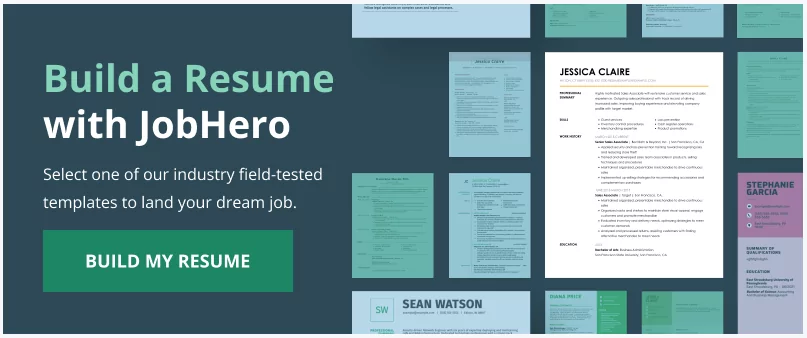
 Read the job post or description closely.
Read the job post or description closely. Align your writing skills to the job description.
Align your writing skills to the job description.

